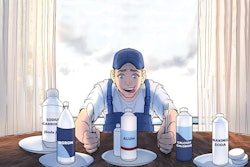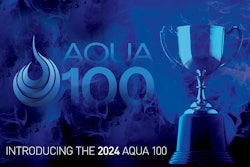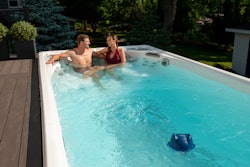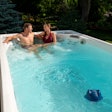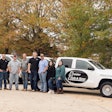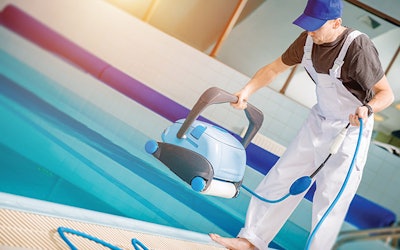
One of the wonderful things about the service industry nowadays is the abundance of excellent, diligent workers ready to get their hands dirty cleaning pools. Finding good help used to be a daunting process of short interviews and long looks, trying to figure out if that gum-chewing kid that just walked in the door listening to the Red Hot Chili Peppers would hold up under the red hot sun.
Luckily, finding good help these days is a breeze. There are quality pool cleaners ready to start work today. They don't complain, ask for days off, and are happy to work for very low wages — you just have to pay the power bill.
That's an uncommon way of looking at it, but it stands to reason that as human labor pool gets shallower and good workers get harder to find — and they're harder to find than they used to be — the smart service company shifts as much of the burden as possible to automatic pool cleaners, leaving trained employees more time for more profitable jobs like pump replacement and heater repair.
RELATED: A Dealer Explains Her Super-Successful APC Sale Event
That's the idea at E-Z Test Pool Supplies, in Plaistow, N.H., according to Pat O'Keefe, company co-founder. "We find it hard to keep the staff necessary to do weekly cleaning," he says. "We want to do the higher profit jobs — not the vacuuming. We want to install pumps and filters, salt chlorine generators and UV. We can't find people to do weekly vacuuming so we use APCs ourselves or sell them to our clients.
"We drop the cleaners in the pool while we test the water and scrub the water line. It's much more efficient, takes fewer people to do the job and less time overall."
The scheme takes a little bit of timing and planning and forethought, but these are staples of every good service company. After planning routes to perfection, planning what supplies and tools to bring from the truck and planning when to hit that super-talkative customer's pool when he's guaranteed to be gone, organizing pool cleaners is a piece of cake. You just need to plan an efficient drop and pickup.
"When we're using pool cleaners on a job," says Steve White, of Underwater Pool Masters in West Boylston, Mass., "we just drop the cleaner in and go to work on something else or go to another job and come back to a pool that has been cleaned. Then we just collect the cleaner."
Little Time Savers
Up in Medicine Hat, Alberta, according to Russel Koch, the time/labor savings offered by APCs is an important element in the business strategy of Backyard Vacations Pool & Equipment, a multi-service company stretched for manpower.
"We are a construction company that also offers service to customers that request their help maintaining a clean pool," he says. "We are so busy with construction projects that we need all the extra time we can get.
"Using an automatic pool cleaner when servicing jobs is especially important when I'm working on several pools in the same geographic area. I put it into the pool and return four hours later. It only takes 20 minutes to put it in and take it out, but I still get my full base rate for an hour of work. And it would take at least an hour of work if I were to have to remain at the pool to clean it manually — with no need to backwash and clean the cartridges. We also incorporate the use of hand-held battery-powered vacs when opening and closing pools — especially to clean out bigger debris and leaves."
Approaching Skynet
One reason APCs have become a mainstay of the service professional is the steady development of convenient features and intelligence that make them easier to deploy and store, and more effective at gathering dirt from a pool.
The nimble new APCs of recent years are quicker and easier to move around the truck and backyard, O'Keefe says. "Not only are they easier to handle, which means easier to carry, easier to put on the truck and easier to lift off the truck, but they now take up much less space. It really saves your back, as the old cleaners were pretty heavy. That's the best thing about the new automatic pool cleaners — how light and compact they have become."
"Best new feature" is an opinion that changes from person to person. When asked to name the top improvements in APCs, industry veteran Steve White named these four, in order:
• Top Loaders: "In the past the APCs were all 'bottom loaded' — which means you had to pull the unit out of the water, flip it over, remove the bag, rinse the bag and clean. But now, we use an APC that has a top-loaded back — which is far easier to work with and really saves time and effort on our service work."
"Now we just pull it out of the water, lay it on the deck, pop open the top, and all the debris is contained on one basket, with no major cleaning of a cloth bag like older models. This is newer to the market and a huge help to our service team."
• Battery-operated units: "The battery-operated units are also amazing, especially for startup cleanings on pools in the spring. When there is a ton of debris and dirt at the bottom of the pool, you use these units to suck out all the debris into a single chamber. One person takes the leaves off the top with a leaf net, the other person uses the battery powered cleaner for the bottom. These are great because you can charge the units overnight at the shop or even in your van. They are very efficient and cost effective."
• Simplicity of design: "The designs are simpler and more rugged. For instance, the brushes are now much better than older APC models. Previously, there was a brush for vinyl and a brush for gunite. But now they are designed with one brush that cleans all surfaces, which makes it faster and easier for us — we don't need to have the brushes changed based on pool type."
• Longer cords: "Having a longer cord is just a nice and helpful feature for commercial jobs with bigger pools."
50 Ways to Use Your Scrubber
The precise ways service companies use APCs vary, as every business is different with challenges unique to their geographic region or clientele. For instance, the biggest cleaning hassle for Chris Morelli on his oceanfront pools is sand. Morelli works with South Strand Pool Maintenance in Surfside Beach, S.C., where sand gets on and into everything — especially pools and spas, and the best way to get it out, he says, is with a hand-held vacuum.
"We have a staff of six," he says, "and five of them use the Pool Blaster Max CG battery powered pool vacs — they are terrific for getting the sand out of pools. Using this type of vac saves us time so we can get more pools cleaned faster, which is especially important since most of our pools are quick clean up jobs in rental homes between renters. We might hit one pool three or four times in one week, and getting the sand out fast is important.
RELATED: Product Roundup — APCs
"Using a handheld vac, we spend at least 20 percent less time than a traditional vac with hose — which takes too much time to set up and put away.
While Morelli is hoovering up the sand, O'Keefe is driving his APC by remote control. Recent APC designs allow steering from a remote location just like the cars in Bond movies. Except they're pool cleaners. "With the remote control, on our commercial pools, we can direct the machines to particular areas while we do other work. It's terrific. Our residential customers love the APC with the remote control, too. They can just sit on the deck use the remote control to send the cleaner to the dirty areas."
Retailing to customers
As APCs have taken on greater responsibilities for service labor, they have also become a revenue stream for pool companies through direct sales to customers. A homeowner with a pool cleaner is often just an easier, cleaner customer.
"We have three retail stores and sold over 100 cleaners this past summer," says O'Keefe. "They are by far the fastest growing product I'm selling. I tell customers they are basically getting a 'roving filter' because these cleaners do 25 to 45 gallons per minute so they run their filter less, save energy, save time and spend more time enjoying their pool.
"The APCs we sell today are very reliable, really work and the warranties are better than in the past. Time is precious for our customers here in New England. It's all about time and money. People don't have time on a Saturday to clean their pool so the APCs are invaluable."
"Invaluable" is a good term to describe the APCs importance to a backyard pool service company, both as a tool and a potential sale. With designs on the drawing board that require even less operator effort and more efficient cleaning, the little automatic helper's role is sure to grow.
The March of APC TechnologyMost service companies are familiar with traditional automatic pool cleaner features, but the technological offering continues to change with the times and trends. In keeping with advancements towards a more integrated backyard that is controllable from anywhere on the planet, Zodiac has introduced an APC with Wi-Fi capability, allowing it to connect to iAquaLink and be controlled from anywhere in the world. And in the energy-saving green product section of the APC market, you can find the Solar-breeze NX robotic solar pool cleaner, which has been on the market for several years. This device cleans leaves and debris off the surface of the pool — it's really a solar powered, mobile skimmer — by paddling around the pool with its solar-powered paddle wheels, scooping up leaves and floaters into a collection chamber. Water moving through the unit is filtered through a nylon mesh, where everything but fine low-radius particles are removed. When it bumps into a wall or obstruction, it just backs away and paddles off in another direction. Your screened-in Florida pools might not benefit as much, but outdoor pools with a blowing leaves and debris could keep a lot of organics out of the water with this product, saving on chemicals, filter cleaning and vacuuming. By scooping up debris off the surface of the pool, according to Denis Ruzsa, vice president of engineering, you can reduce daily pump/filtration times, extend filter cleaning cycles and reduce chemical usage. "We tell people you can reduce your pumping by two thirds and still get better water quality," he says. |
Comments or thoughts on this article? Please e-mail [email protected].























